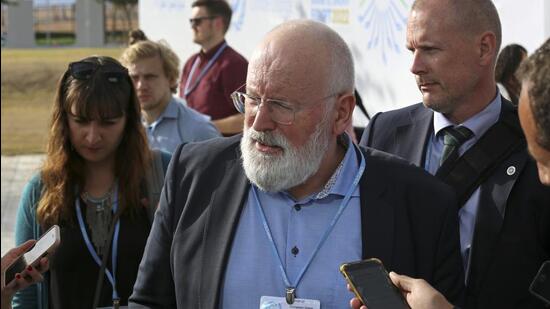COP27: EU proposes Loss & damage funding facility from broad donor base
Logjam over the facility, one of the contentious issues on the agenda of the United Nations Climate Change Conference (COP27) in Sharm El Sheikh, continued
Sharm El Sheikh: The European Union (EU) has proposed a loss and damage funding facility from a broad donor base to only support the most vulnerable countries as a logjam over one of the contentious issues on the agenda of the UN Climate Change Conference (COP27) in Sharm El Sheikh continued till late on Thursday evening.

Observers and negotiators earlier this week said both the US and EU were looking to expand the donor base to include “high income” and “emerging economies” including China and India, ignoring the Paris Agreement provision that climate finance will flow from developed to developing nations.
The EU proposed to establish a loss and damage response fund for the most vulnerable countries through the CMA (Conference of the Parties serving as the meeting of the Parties to the Paris Agreement) and under Article eight of the pact.
“This fund would be established at this [Sharm El Sheikh] CMA and be designed to respond to the needs of the most vulnerable countries to the adverse effects of climate change. The details of this fund will be designed in accordance with a work plan also to be agreed upon at the CMA and in a way that would enable it to receive financing from sources from a broad donor base. It will be one part of a mosaic of solutions including looking into debt and the multilateral development banks,” said EU’s climate policy chief Frans Timmermans at a COP27 Presidency’s informal stocktaking.
He added innovative sources of finance will be needed for the facility including levies on aviation, shipping, and fossil fuels. Timmermans said countries should stay on course for the target to keep the global average temperature increase at 1.5 degrees Celsius. “To us, if we do not scale up ambition or mitigation immediately, we will pass tipping points and no amount of loss and damage will be enough.”
He said keeping a clear focus on limiting global warming to 1.5 degrees Celsius compared to pre-industrial levels is of utmost priority and also a key to limiting loss and damage. “...we want to create a space for parties to discuss how to make all finance flows support the objectives of the Paris Agreement and pathways towards just transition,” Timmermans said.
He called for going beyond the 2021 Glasgow Climate Pact to pursue and accelerate the phase down of unabated coal power as soon as possible and roadmaps towards this aim. Timmermans referred to phasing out of inefficient fossil fuel subsidies to enhance the implementation of renewable energy sources and enabling 1.5 degrees Celsius compatible pathways.
Timmermans underlined the need for the reduction of global methane emissions by at least 30% by 2030, relative to 2020 levels.
Until now the talk of expanding the donor base was held behind closed doors in negotiation rooms. Timmermans made the EU stand clear on their expectation to expand the donor base for loss and damage funding. Switzerland and Norway backed the idea.
Diego Pacheco, Bolivia’s negotiator, and the Like-Minded Developing Countries (LMDC) spokesperson, countered the attempt by rich countries to expand the donor base for all climate finance and include emerging economies in taking up similar mitigation targets.
“They promised a lot in Copenhagen in 2009 [$00 billion]. We are still waiting. They were not $100 billion per year. Also developed countries are pushing very hard for the 1.5 degrees Celsius goal in the context of achieving a net zero by 2050 to solve the climate crisis, but this is really a lie because this is not as per the convention and Paris agreement.
“They are really creating the scenario to shift the burden to developing countries and to the private sector,” Pacheco said. He said rich nations were focussing only on 1.5 degrees Celsius and set nearly uniform mitigation goals without factoring in historical responsibility.
“They do not want to provide financial resources to the developing countries and are trying very hard to open new ways for the provision of finance. ...we witnessed efforts by developed countries in...the negotiation process...to dilute all the agenda items...”
He said it is really problematic to hear interpretations of the international climate regime and of their obligation or responsibilities for solving this climate crisis. “...we have serious concerns...because developed countries are diluting and deleting decisions regarding equity and common but differentiated responsibilities.”
Earlier in the day, a member of the Indian delegation acknowledged efforts to expand the donor base and remove references to differentiation. “They can propose what they like but a decision will be taken by consensus. The Paris Agreement and its categorisation of countries are supreme. There is a provision in the Paris Agreement that states those who have the capacity and are willing to can contribute to financing. But it is an invitation and not an obligation.”
A negotiator said when principles of equity and common but differentiated responsibilities are erased what that would essentially mean is that they clean up the mess or take on the mitigation burden for historical polluters. “Is not that unfair? The developing countries in particular the Like-Minded Developing Countries, the African group, Arab group, Argentina-Brazil-Uruguay are pushing to get balance now,” the negotiator for one of these groups said on Wednesday.





